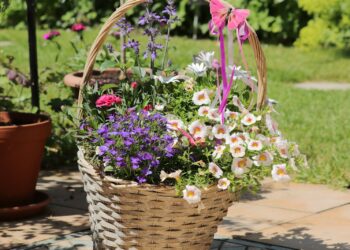Maintaining a healthy garden without resorting to chemical pesticides is not only beneficial for the environment but also for your health. Natural pest control methods can effectively manage garden pests while promoting biodiversity and protecting beneficial insects. Here’s a detailed guide on sustainable strategies for keeping your garden pest-free.

Understanding natural pest control
Natural pest control involves using environmentally friendly methods to manage pests. This approach focuses on prevention, biological controls, and physical barriers rather than chemical solutions.
- Prevention: The best way to control pests is to prevent them from becoming a problem in the first place. Healthy soil, proper watering, and selecting pest-resistant plants are key steps.
- Biological controls: Utilizing natural predators, parasites, and beneficial microorganisms to control pest populations is an effective and sustainable approach.
- Physical barriers: These include methods like row covers, netting, and traps to physically block or capture pests.
Creating a healthy garden ecosystem
A healthy garden ecosystem is less likely to suffer from severe pest problems. By fostering biodiversity, you can create a balanced environment where pests are naturally kept in check.
- Companion planting: Planting certain species together can repel pests or attract beneficial insects. For example, marigolds can deter nematodes, and basil can repel mosquitoes and flies.
- Attract beneficial insects: Plant flowers like daisies, yarrow, and alyssum to attract ladybugs, lacewings, and other beneficial insects that prey on pests.
- Crop rotation: Changing the location of your plants each season can prevent pests and diseases from becoming established in the soil.
Natural pest repellents
Several natural substances can repel pests without harming the environment. These repellents are easy to make and use in your garden.
- Neem oil: Derived from the neem tree, neem oil is effective against a wide range of pests including aphids, whiteflies, and spider mites. Mix with water and a few drops of dish soap and spray on affected plants.
- Garlic spray: Blend garlic cloves with water, strain, and spray on plants to repel insects like aphids and caterpillars.
- Diatomaceous earth: This powdery substance is made from fossilized algae and can be sprinkled around plants to deter slugs, beetles, and other crawling insects.
Biological pest control
Biological pest control involves introducing or encouraging natural predators and parasites that target garden pests.
- Ladybugs: These insects are voracious eaters of aphids, mites, and other soft-bodied pests. You can purchase ladybugs and release them into your garden.
- Nematodes: Beneficial nematodes are microscopic worms that can be applied to the soil to target grubs, beetles, and other soil-dwelling pests.
- Predatory insects: Insects like lacewings, predatory beetles, and parasitic wasps can help keep pest populations under control.
Physical barriers and traps
Using physical barriers and traps can effectively protect your plants from pests without chemicals.
- Row covers: Lightweight fabric covers can protect plants from insects and birds while allowing light, air, and water to penetrate.
- Copper tape: Placing copper tape around garden beds can deter slugs and snails due to a reaction between their slime and the copper.
- Sticky traps: Yellow sticky traps can be placed around the garden to capture flying insects like whiteflies and fungus gnats.
Tip
Use companion planting and introduce beneficial insects like ladybugs to naturally manage garden pests while promoting a healthy ecosystem.
My personal experience with natural pest control
In my own garden, I faced a significant aphid infestation last year. Instead of reaching for chemical pesticides, I introduced ladybugs and used a homemade garlic spray. The results were impressive – the ladybugs quickly reduced the aphid population, and the garlic spray helped keep them at bay. This experience reinforced my belief in the effectiveness of natural pest control methods.
Maintaining a pest-free garden
Consistency is key to maintaining a pest-free garden. Regular monitoring and early intervention can prevent minor pest issues from becoming major problems.
- Regular inspection: Check your plants regularly for signs of pests or damage. Early detection can make control easier and more effective.
- Healthy soil: Maintain soil health through composting, mulching, and avoiding over-fertilization, which can attract pests.
- Clean gardening practices: Remove dead leaves, weeds, and other debris that can harbor pests.
Conclusion
Natural pest control methods provide sustainable, effective solutions for maintaining a healthy garden. By fostering biodiversity, using natural repellents and biological controls, and employing physical barriers, you can protect your plants without harming the environment. These strategies not only help keep pests at bay but also contribute to the overall health and resilience of your garden.
Frequently asked questions
- What are some natural ways to repel garden pests? Neem oil, garlic spray, and diatomaceous earth are effective natural repellents. Companion planting and attracting beneficial insects also help in repelling pests.
- How can I attract beneficial insects to my garden? Plant flowers like daisies, yarrow, and alyssum to attract beneficial insects such as ladybugs and lacewings, which prey on common garden pests.
- What is companion planting and how does it help with pest control? Companion planting involves growing certain plants together to repel pests or attract beneficial insects. For example, marigolds can deter nematodes, and basil can repel mosquitoes.
- How can I use physical barriers to protect my plants? Use row covers, copper tape, and sticky traps to protect plants from pests. These barriers physically block or capture pests without the need for chemicals.
- What should I do if I find pests in my garden? Regularly inspect your garden for pests. If you find any, use natural remedies like neem oil or garlic spray, introduce beneficial insects, or employ physical barriers to control the infestation.
Sources
1. The Spruce – Natural Pest Control Methods 2. Good Housekeeping – Natural Pest Control Solutions 3. Better Homes & Gardens – Organic Pest Control 4. HGTV – Tips for Natural Pest Control 5. Bob Vila – How to Control Garden Pests Naturally
About me:
I’m Sophia, a home organization enthusiast who loves transforming spaces into serene and functional havens. With a background in interior design and a passion for practical solutions, I enjoy sharing tips and ideas to help others create clutter-free homes. I believe that an organized space can lead to a more peaceful and productive life.



